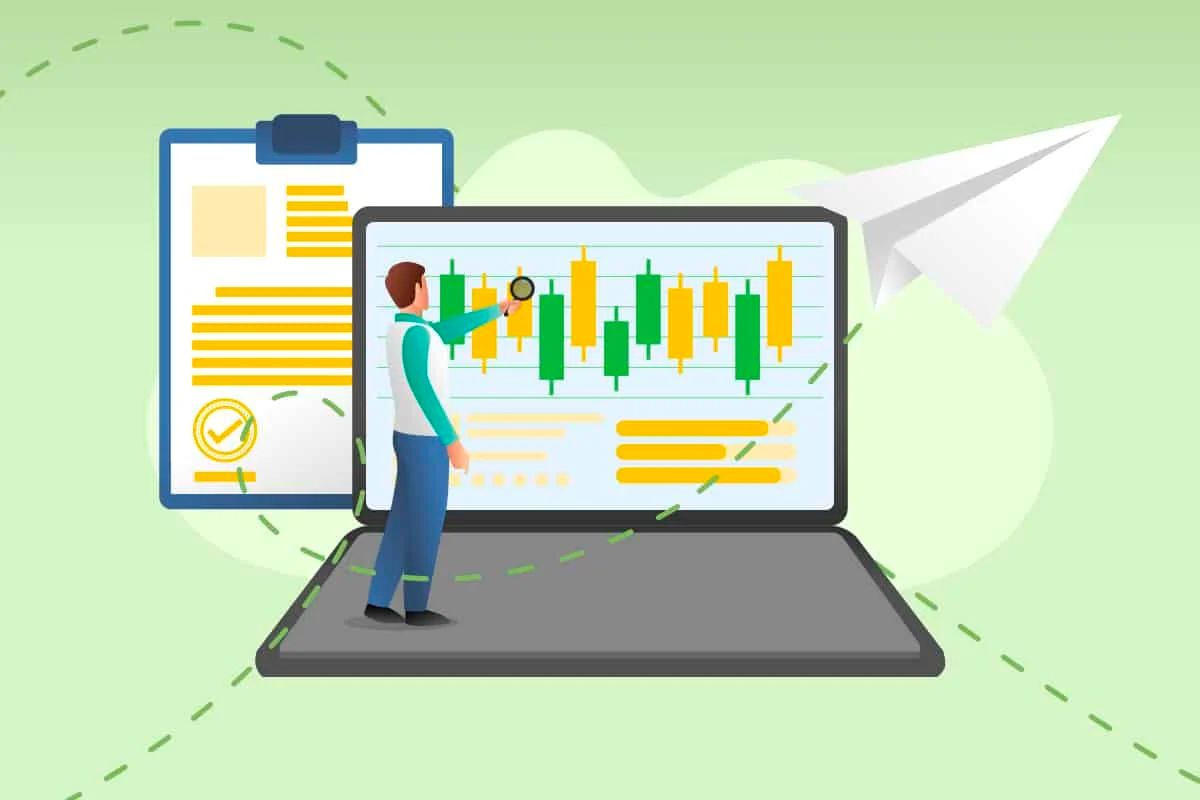
The trading market is growing in terms of both markets and techniques. That is why so many newcomers want to give it a go. Trading may be both exhilarating and daunting for newcomers. Trading does not always result in profits; it may sometimes result in losses, particularly for newcomers. So, if you’re a new trader, don’t miss these essential tips on how to start trading for beginners. This article will provide you with the basic trading terms, deeper analytics on its potential risks for beginners, and some helpful tips to help you out. Let’s start!
What is Trading?
Trading is simply purchasing and selling assets with the goal of profit. A transaction may be completed via an exchange or over-the-counter (OTC). An exchange is a market platform where brokers trade various financial products on behalf of their customers.
Large corporations often use the stock exchange approach. An OTC transaction takes place directly between two parties. OTC trading is a more informal method in which both parties finish the transaction by email or phone.

Stockbrokers often purchase, sell, and trade stocks on behalf of their customers. They advise their customers on which stocks to buy and how long to keep their position based on their long-term objectives.
In recent years, individuals with less professional trading knowledge are increasingly learning about trading and investing via avenues other than the stock market. We may simply access, open an account, and engage in the trading market due to the ease of the internet and the popularization of the trading market. The tale of how to start trading for beginners, on the other hand, is never simple.
What Are Potential Risks That Trading Beginners Can Face?
There are a few risks that new and long-term investors may face at the start of the investing process.
Market Danger
This is a kind of systemic risk that fluctuates with the market’s prices on an everyday basis. The market fluctuates throughout the day. And it may often have an impact on a stock’s performance. For example, if the market is falling simultaneously, the values of even excellent equities may fall.
Business Danger

The second sort of stock risk comes from the company. If the company is not performing well, this risk might be increased. Business risk is caused by managerial failure, bad quarterly performance, or poor judgment in selecting a company.
However, diversification may help to lessen this risk. The likelihood of one firm failing to operate successfully is ‘high’ compared to five similar businesses. As a result, if you have five stocks in your portfolio instead of one, you may lessen business risk.
Inflationary Danger
When the price of raw materials rises due to inflation, the cost of manufacturing rises as well. The inflationary risk significantly impacts many firms engaged in commodities such as oil, soya bean, etc.
Additionally, some sectors have excessively high inflation rates. Consider education and healthcare. Tuition fees for schools and universities are rapidly rising. However, it may seem excellent in the short term since these sectors would profit from the higher pricing. However, in a long time, it may hurt client retention.
Liquidity Danger
Before investing in a stock, be sure that the firm is solvent. Companies with a lot of debt may have trouble paying their expenses. Even worse, they might eliminate dividends altogether or declare bankruptcy. Liquidity concerns exist in all companies.
Taxability Danger
Taxes in the sector where you invested may increase or decrease due to frequent tax adjustments made by the government. The stock price might be impacted by tax reform.
Furthermore, specific sectors are taxed more heavily than others. Therefore, their net profit after tax may be lower. Furthermore, since the government regulates taxes, there is nothing that management or investors can do.
Interest Rates Danger

The open market or worldwide market interest rates fluctuate over time. Depending on the direction of the interest rate, this might have a beneficial or harmful impact on the stock market.
For instance, a company may have trouble borrowing money with high interest rates. Furthermore, a collapse in the bond market might affect corporate bonds if interest rates were to increase.
Regulatory Danger
Various restrictions are applied in various businesses, which must also be referred to as the risk associated with stocks. Cigarettes, telecommunications, drinks, pharmaceuticals, and a few other companies, for example, are heavily controlled.
Suppose a pharmaceutical business loses any of its medication manufacturing rights/permission due to a regulatory effect. In that case, it will undoubtedly impact the company’s earnings and, as a result, the stock price.
With a wide variety of risks you will be exposed to, you may opt to invest under professional investors on the copy trading platform, specifically for new investors to follow the latest trends authorized investors. In addition, you also need to refer to tips on how to start trading for beginners.
8 Tips on How to Start Trading for Beginners

The purpose of a trader is straightforward: buy cheap and sell high. This option, however, requires thorough research and market understanding. If you want to trade full-time or part-time, you must learn how to trade, understand the dangers, and make measured judgments.
Learn how to start trading for beginners by following these tips and lessons that will assist you in making sound decisions.
Start with Copy Trading If You’re Newbie
Joining a copy trading platform can be an excellent low-risk way for beginners to learn the ropes of trading, as long as proper due diligence is done and risks are managed. But the goal should be to transition into making your own trading decisions over time.
Try to join WeCopyTrade and learn about copy trading, choose reputable investors, then start your first trading activities.
Read more: What is Copy Trading? How to Profit from Others’ Expertise?
Begin Small
If you want to start trading but aren’t sure where to invest, it’s best to start modestly. Begin with a predetermined quantity of money and concentrate on no more than two to three equities for the first several weeks. This allows you to focus your cash and gradually raise them once you understand how the trading market works.
Concentrating on a particular area, industry, or firm is strongly advised. In the long term, this targeted strategy aids in making good selections rather than relying on every tip or trade advice you receive.
Set Realistic Objectives

Most stock trading classes will tell you that each investment or trading activity must be tied to a financial objective. This is significant because it allows traders to evaluate their risk tolerance and link it to the budget they want to utilize. Once you’ve learned to trade, you may put money away and start selling.
So, set realistic objectives while accounting for occasions when things may not go as planned. Significantly, the most experienced traders win roughly 40% – 60% of the time, and this figure might be considerably higher for novices. Learn to trade by including this risk in your aim, resulting in a well-defined purchasing strategy.
Be Prepared to Change Your Plans
Any strategy will fail if it fails to account for external forces that influence it. Learn how to trade by using best practices and ways to maximize earnings while minimizing risks. However, traders should not lose sight of the market and should integrate the most recent trends into their strategy.
Always be ready for market volatility; if the market isn’t going in your favor, abandon any holdings to reduce losses. Base your stock market knowledge on the most recent trend rather than your analysis, and resist the urge to sell if the chances are not in your favor.
Always Have an Exit Plan

In line with your objective, after you have achieved decent returns and finished the trading process, you must know when to leave. The exit plan will be based on your aims and market trends.
For example, it is time to depart if you expect to gain 20% for the day, but market trends begin to indicate a negative trend. To get the most remarkable outcomes, base your exit plan on market research and financial objectives.
Not only should you create trading objectives, but you should also set expectations and stop losses for each stock in which you invest. This will reduce your losses while allowing you to earn profits when the defined aim is attained. Learn to trade by developing an exit plan that will save you from waiting too long for more gains that may never come.
Before You Invest, Do Your Research
Once you’ve determined your objectives, begin investing in stocks or commodities that you believe are acceptable. However, before you invest, you should thoroughly investigate the background, financial records, market analytics, and other research.
Set aside time to study and follow research materials that will help you assess the market and learn to trade more effectively. Also, set aside time to read about stock market news, identify possibilities, and look through online resources and courses. This will assist you in broadening your knowledge and learning to trade.
Knowledge Is Might

In addition to learning the processes and procedures, learn to trade using your knowledge. Subscribe to research and the most recent stock market news to find chances. Because trading is fast-paced and even little delays may have significant consequences, learn to trade by considering interest rates, market movements, and the economic forecast and basing your choice on it.
Set aside time while the market is open to study how to trade utilizing industry knowledge and influences. Furthermore, after the market has closed, begin planning your next move and learning to change, taking sensible risks, and using trading charts to improve your chances of success.
Learn more about trading tips on WeMasterTrade!
Understand When to Trade
Most newcomers and investors make their first investments when the market opens, expecting to profit from the new rates. However, this causes price volatility, which most seasoned players detect and exploit at opportune periods.
Before purchasing, time your purchases and learn to trade by understanding market patterns. While rush hours may provide substantial chances, the middle hours are less volatile and provide time to determine if there is notable change before the day’s finish. Learn to trade by making informed judgments and entering the market appropriately.
Final Words
You may also try our recommendations on how to start trading for beginners, or the optimized copy trading strategy on the WeCopyTrade platform, which has several advantages for novice investors. You may get access to successful traders’ expertise: Copiers may benefit from providers’ expertise, talents, and techniques without having to do all of their own research.





